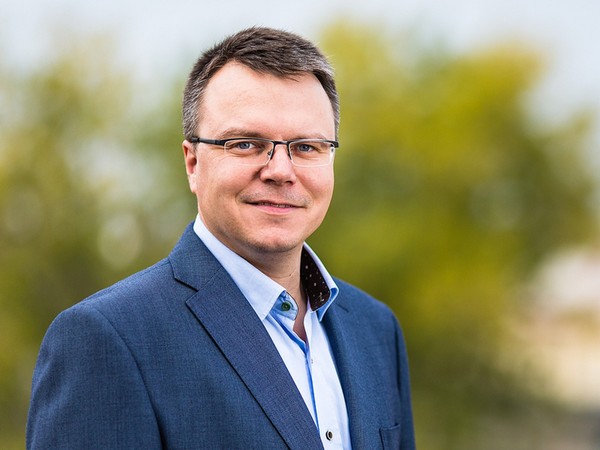Thanks to CATRIN, Palacký University has won the prestigious TECHSCALE (Technology Beyond Nanoscale) project from the Excellent Research OP JAK call with a budget of almost half a billion Czech koruna. The multidisciplinary team will be led by the physical chemist Michal Otyepka.
Many scientists in the Czech Republic have recently applied to the Excellent Research call from the Operational Programme Jan Amos Komenský. The TECHSCALE project led by you succeeded amongst stiff competition. Moreover, it garnered high ratings in its field. What does this success mean to you?
We devoted a huge effort to the preparation of the project proposal, and in this pre-Christmas period, I recall the sleepless nights and several near-heart attacks that the whole team went through this time last year. But the incredible stress then turned into great joy when the results were announced. I view the second place we were awarded in such a prestigious project call not only with satisfaction but also as a mark of appreciation of the consistent and long-term work of ourselves and our partners from Charles University and CEITEC-VUT. I also think that we have managed to assemble a great interdisciplinary team that includes the humanities as well as natural sciences. Together we have been looking for ways of cooperation that will allow us to significantly push the boundaries of the current world of nanomaterials towards technologies that work with single atoms.
You have a number of other achievements to your credit, including four times success in the European Research Council’s grant competition. Did this experience help?
We build on our experience when preparing new projects, and thus continuously improve project proposals. It’s a never-ending story. I think that CATRIN has moved forward enormously in the field of international project grants over the last two years; we are capitalizing on our investment in this area and are now seeing the first results. In addition to science itself, international projects highlight a number of other topics that deal with implementation and impacts. We have certainly benefited from our experience with international projects within TECHSCALE.
You expect major discoveries that will push the boundaries of current nanotechnologies and find applications in a wide range of areas. What exactly can we look forward to?
Nowadays, nanomaterials and nanotechnologies are among well-established scientific disciplines that have advanced our knowledge and attract a huge number of applications. The whole project has a unifying theme, which is to push the boundaries of the nanoworld and achieve precision in tuning properties up to the level of single atoms. We want to design such materials and prepare them in a controlled way. Already during the design phase, we will consider the safety of materials and possible social impacts. We will then target three major areas where we envisage the greatest potential for application, i.e. sensors, catalysis and energy storage. I believe that we will be able to prepare new materials that will change the paradigm, for example, in the fight against antibiotic resistance, alongside designing very effective catalysts for industrial production or preparing selective and sensitive sensors.
In what way do you think the project is unique?
A unique element of the project is the interconnection of four pillars. These are computer design, synthesis and characterization of new materials, their application, as well as safety and social impacts. Recent crises have taught us that technicians and natural scientists must work closely with experts from social science. Such cooperation allows new topics to be tackled, reveals entirely new perspectives and raises questions that natural scientists do not normally ask. I think this organic interconnection of disciplines was also highly appreciated by the evaluators of the project.
How do you and your colleagues in the social sciences learn to find common ground?
Honestly, it’s a slow evolution. It’s not easy for either side. I’d compare it to a very coy courtship. I know from previous projects that sometimes it only takes about a year to find common ground. The great thing is that we all are seeking a way to accommodate each other because we see the enormous potential that effective interconnection can provide. I’m convinced that this effort will soon bear fruit.
The project has already achieved its first results in the form of publications in prestigious journals. Can you describe some of them?
We are just starting a number of new joint projects. The existing cooperation has certainly accelerated everything. For example, we have recently managed to find a way to improve ammonia production with our colleagues from CEITEC Energy. In addition, we have used the computing capacity of the IT4Innovations National Supercomputing Centre at VSB – Technical University of Ostrava. These achievements clearly show that broad cooperation is the only way to progress and remain internationally competitive. I believe that this project will enable us to intensify our cooperation at home and abroad. I also believe that our International Scientific Board, which includes six of the world’s leading experts, will help us in this.
Prof. RNDr. Michal Otyepka, Ph.D. (*1975)
Prof. Michal Otyepka studied physical chemistry at Palacký University Olomouc. From 2008 to 2020, he was Head of the Department of Physical Chemistry. He now heads the Regional Centre of Advanced Technologies and Materials at the Czech Advanced Technology and Research Institute (CATRIN-RCPTM) and works at the IT4Innovations National Supercomputer Centre at VSB-TUO.
He studies the structure and properties of nanomaterials and biomacromolecules. He played a key role in the discovery of the thinnest isolator in the world — fluorographene — and was involved in the development of the first non-metallic magnet. In 2014, he received a Neuron Impuls grant from the Neuron Foundation. In 2015, he was awarded a grant from the European Research Council (ERC) and the first EIC Transition grant in the Czech Republic. In 2020, he was the first ever Czech scientist to receive an ERC Proof of Concept grant, and in the following years, he repeated this success twice.
